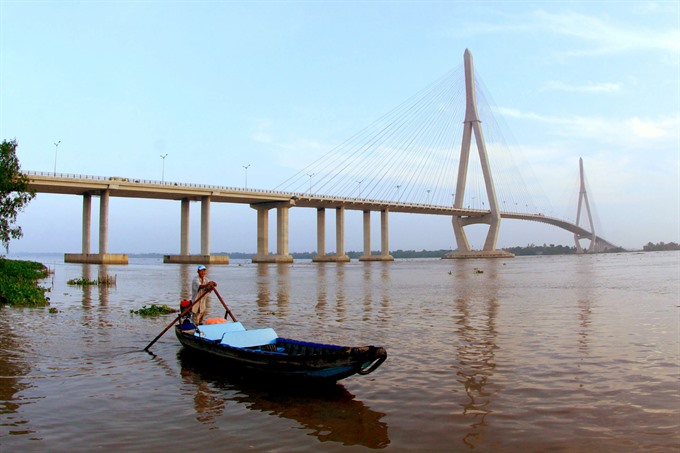 Economy
Economy

Transport infrastructure in the Mekong Delta has recently seen huge investments, but the region still faces many connectivity challenges as many of the works have stalled or been delayed.
 |
| The cable-stayed Cần Thơ Bridge over the Hậu River in the Cửu Long (Mekong) Delta. The 15.9km bridge is the longest of its kind in Southeast Asia. — VNA/VNS Photo Duy Khương |
HCM CITY — Transport infrastructure in the Mekong Delta has recently seen huge investments, but the region still faces many connectivity challenges as many of the works have stalled or been delayed.
According to the Ministry of Transport, it plans to complete 46 transport works from now through 2020, 39 of them roads, at a total cost of VNĐ76.5 trillion (US$3.35 billion).
Another 19 road projects costing VNĐ66.1 trillion ($2.9 billion) are also under way with other sources of funding.
Completed works include the Cần Thơ, Hàm Luông, Cổ Chiên, Mỹ Lợi, and Năm Căn bridges, the HCM City – Trung Lương Expressway, the Quản Lộ - Phụng Hiệp road, and a road on the south of the Hậu River.
But ministry and local officials admitted the delta still faces many hurdles to smooth transportation. The biggest involves the region’s major road running from HCM City to Cần Thơ.
This comprises two road sections: from Trung Lương to Mỹ Thuận costing VNĐ9 trillion ($395 million) and from Mỹ Thuận to Cần Thơ costing VNĐ7 trillion ($307 million).
But lack of funds and policy issues have acted as speed bumps.
Late last week, Deputy Prime Minister Trịnh Đình Dũng inspected the Trung Lương – Mỹ Thuận section and called for completing the project by 2020. He called on banks to lend money for it.
The intra-delta N2 has been delayed by a crack discovered recently in a girder on the Vàm Cống Bridge.
The ministry has not been able to identify the cause so far.
National Road No 60 linking National Road No 1 in Trung Lương with Trà Vinh Province has also been delayed. The road project, which will reduce the distance between Cà Mau Province and HCM City by 70km, includes the Đại Ngãi and Rạch Miễu 2 bridges.
But work on the Đại Ngãi Bridge has just started and no one is willing to invest in the Rạch Miễu 2 Bridge.
Bến Tre Province now plans to acquire the project with financial support from the Government.
“We will widen National Road No 60 and build these two bridges under public-private partnership model to reduce traffic pressure on Bến Tre Province,” Cao Văn Trọng, chairman of the provincial People’s Committee, was quoted as saying by Sài Gòn Giải Phóng (Liberated Sài Gòn) newspaper.
Waterway projects stuck
According to a report from the delta province of Trà Vinh, since ships travel up the Quan Chánh Bố Canal to the Hậu River, social order has come under pressure with locals complaining about landslides caused by the wake of these vessels.
They even stopped canal maintenance work and gathered to protest.
A new canal through National Road No 53 and Provincial Road No 913 has caused the three communes of Đông Hải, Long Vĩnh and Long Khánh, and Long Thành town to become islands.
“Large ships travelling to the Hậu River has brought economic benefits to provinces in the area, sharply reduced transport costs for businesses and eased pressure on roads to HCM City,” a province official said.
“But construction [of new canals] has caused the province to suffer a lot.”
The province is seeking VNĐ1.83 trillion ($80 million) from the Government to resolve the problems locals face in their daily life.
Meanwhile, work to widen the major waterway route linking the Mekong Delta and HCM City, the Chợ Gạo Canal in Tiền Giang Province, remains stuck due to lack of funds.
The upgrade work was approved in 2009 but its first phase only began in 2013. The second phase has yet to begin.
This work too has caused landslides, and three people have so far lost their lives as a result.
The project is expected to allow the transport of 20-30 times the cargo that can be carried by road and also lower transport costs. — VNS




